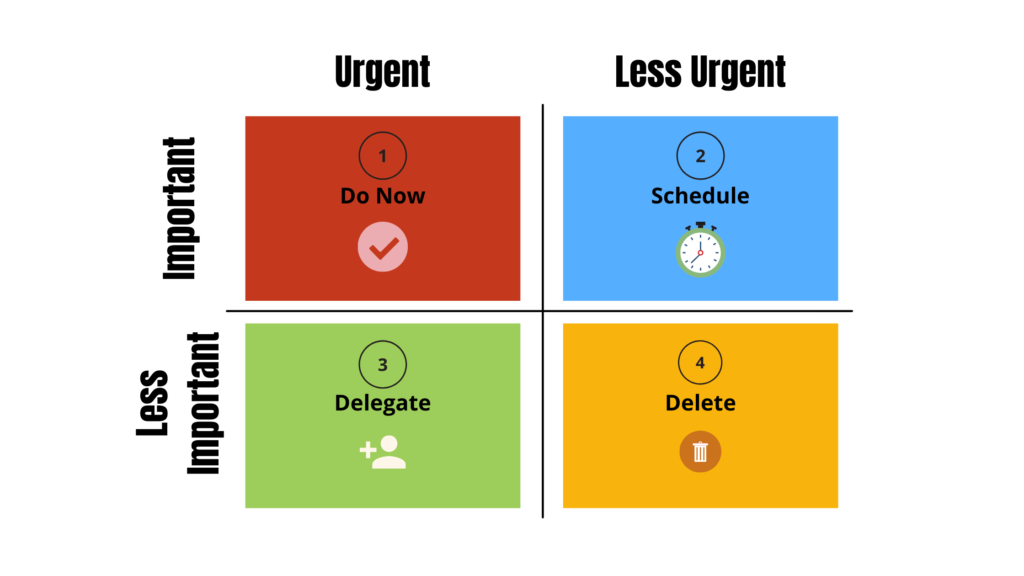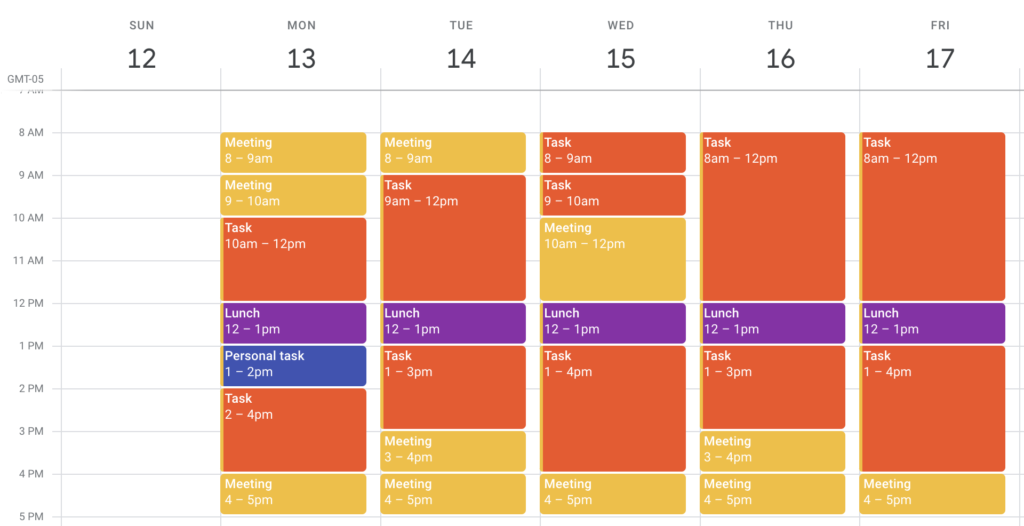
Have you ever had that feeling that time is always slipping through your fingers? That no matter how hard you try, it seems like you never manage to get everything done that needs to be done?
Well, you’re not alone. Time management is one of those skills we all wish to have complete mastery over, but often it seems to slip out of our total control.
But what if I told you there’s a way to turn this situation around? Yes, it’s true! Developing effective time management skills can make all the difference between feeling constantly overwhelmed and finding balance and productivity in your life.
In this informal guide, I want to share with you some practical tips that I use in my day-to-day life, which have greatly helped me to organize and improve my time management, whether it’s on weekdays during work or even transitioning from work to making the most of my leisure time.
Here you’ll see everything from simple organization techniques to advanced task prioritization strategies to optimize your time. Let’s learn how to set clear goals, prioritize tasks, eliminate distractions, and even find time for what really matters.
But in the end, remember, everyone has their own way of organizing and feeling comfortable with it all. In other words, my tips are just tests to apply to your routine and see which ones work best for you.
1) Establish clear objectives

It all begins with a good organization to establish a clearer and more viable plan for day-to-day activities.
Setting clear objectives is akin to charting a map to your success. Without knowing where you’re headed, it becomes difficult to choose the best path to get there. That’s why defining objectives is so crucial when it comes to effectively managing time.
Start by identifying what you wish to achieve in the short term — it could be something as simple as completing a project by the end of the week or as ambitious as reaching a sales target for the next quarter. Then, consider your long-term goals — where you want to be in a year, five years, or even a decade.
When establishing these objectives, ensure they are specific, measurable, attainable, relevant, and time-bound. This will help ensure your objectives are clear and actionable.
Once you have your objectives set, it becomes easier to prioritize your daily tasks and allocate your time more effectively. You’ll be able to pinpoint which activities are most crucial for achieving your objectives and concentrate your energy on them. This helps to avoid wasting time on tasks that aren’t aligned with your objectives or that don’t contribute to your progress.
Do not underestimate this type of organization. I assure you that with clear objectives in mind, you’ll be on the right path to more effective time management and to achieving the success you desire.
2) Create a task list
Creating a task list is akin to constructing a map of your day — it helps visualize everything that needs to be done and plan your route to achieve your objectives. It’s a simple yet incredibly effective tool to help you stay focused, organize your priorities, and manage your time more efficiently.
Begin by listing all the tasks you need to accomplish within a specific period — whether it’s daily, weekly, or even monthly, depending on your preference and the workload ahead. Break down larger tasks into smaller, more manageable steps to make them less daunting and easier to tackle.
Once you have your task list, it’s time to start prioritizing. Identify the most important and urgent tasks and place them at the top of the list. Then, rank the remaining tasks based on their importance and deadline. This will help ensure that you’re dedicating your time and energy to activities that truly matter and contribute to your goals.
As you complete each task, check it off the list. The sense of accomplishment in crossing off a completed task can be incredibly rewarding and motivating, encouraging you to keep progressing throughout the day.
And don’t forget to experiment. Try different prioritization methods, task management tools, and applications, etc. What works for me may not work for you. But over time, you’ll develop a system that works best for you and helps you achieve your goals more effectively.
3) Prioritize tasks
Now that you’ve organized yourself and created your task list, as mentioned above, you need to know what to prioritize.
With the busy lives many of us lead, it’s easy to feel overwhelmed with an endless list of things to do. That’s why it’s essential to learn to identify and prioritize tasks that have the greatest impact on your goals and outcomes.
An effective way to prioritize tasks is by using the Eisenhower Matrix, a simple yet powerful tool that helps classify tasks based on their importance and urgency. The matrix divides tasks into four quadrants:

- Important and Urgent: Tasks in this category are those that require your immediate attention. They are urgent and have a significant impact on your goals. These tasks should be dealt with immediately and are your top priority.
- Important, but Not Urgent: Tasks in this category are those that have a significant impact on your goals but do not require your immediate attention. They are important for your long-term success and should be scheduled and managed proactively.
- Urgent, but Not Important: Tasks in this category are those that require your immediate attention but have minimal impact on your goals. They are urgent but can be delegated or eliminated, if possible, to free up time for more important activities.
- Not Important and Not Urgent: Tasks in this category are those that have minimal impact on your goals and do not require your immediate attention. They are usually distractions and time-wasters and should be avoided whenever possible.
By using the Eisenhower Matrix, you can visualize your tasks clearly and objectively and make informed decisions about how to allocate your time and energy. This helps ensure that you are focused on activities that truly matter and contribute to your long-term goals.
4) Use time blocks

Using time blocks is akin to dividing your day into manageable segments and dedicating specific periods to different types of activities. This can help increase your productivity, focus, and efficiency by allowing you to fully concentrate on one task at a time and avoid distractions.
The idea behind time blocks is simple: rather than trying to juggle multiple tasks simultaneously, allocate dedicated time slots for each activity on your task list. For instance, you might assign an hour in the morning for answering emails, followed by two hours of focused work on a specific project, followed by a lunch break, and so forth.
When creating your time blocks, take into account your personal preferences and energy patterns throughout the day. For example, if you’re most productive in the morning, reserve this period for your most challenging and important tasks. If you tend to experience an energy slump in the afternoon, use this time for lighter or administrative activities.
Additionally, remember to include regular breaks between your time blocks. These pauses can help recharge your energy, prevent burnout, and enhance your ability to concentrate when you return to work.
5) Eliminate time wasters
Eliminating time wasters is akin to clearing the path to success, and removing obstacles that hinder you from reaching your goals. Often, we waste time on activities that keep us busy but don’t lead us anywhere. Identifying and eliminating these activities can free up precious time and energy to focus on what truly matters.
An effective way to identify time wasters is to critically analyze your daily activities and assess whether they contribute to your goals and priorities. Ask yourself: Is this activity bringing me closer to my objectives? Am I gaining real value from it? If the answer is no, consider eliminating or reducing that activity from your life.
Some common examples of time wasters include excessive use of social media, which can consume precious hours of your day without bringing tangible benefits; unnecessary meetings, which often can be replaced by more efficient communication via email or phone; and multitasking, which can reduce the quality of your work and decrease your productivity.
By identifying and eliminating time wasters, you can free up time and energy to focus on what truly matters and achieve your goals more effectively. This can result in a greater sense of accomplishment, less stress, and a more balanced and fulfilling life.
6) Learn to say no

Learning to say no is an essential skill for preserving your time, energy, and mental well-being. Often, we find ourselves overwhelmed with obligations and requests that pull us away from our goals and priorities. Saying no respectfully and assertively can help you stay focused on what truly matters and avoid overcommitting.
Saying no doesn’t mean being rude or insensitive. On the contrary, it involves clear and honest communication about your boundaries and priorities. By being selective about how you invest your time and energy, you can ensure that you’re dedicating resources to projects and activities that truly matter to you.
An effective way to learn to say no is to clearly define your goals and priorities. When you know what’s important to you, it becomes easier to discern which requests deserve your attention and which can be declined. Additionally, remember that saying no to one thing often means saying yes to another. By declining a request that isn’t aligned with your goals, you’re freeing up space and energy to focus on what truly matters to you.
By learning to say no respectfully and assertively, you can protect your time and energy for the things that truly matter, reduce stress, and increase your productivity and personal satisfaction.
7) Take regular breaks

Another underestimated factor by many, yet one that greatly benefits our lives.
Taking regular breaks throughout the day is crucial for maintaining your physical, mental, and emotional health, as well as improving your productivity and performance at work. When you work for long periods without adequate breaks, your ability to concentrate decreases, your productivity drops, and you risk physical and mental burnout.
Scheduling short breaks throughout the day can help prevent these issues by allowing you to recharge your energy, rest your mind, and approach your tasks with a renewed perspective. During these breaks, you can stand up, stretch, get some fresh air, have a snack, or simply relax for a few minutes. The key is to give yourself a moment to disconnect and recharge.
In addition to short breaks throughout the day, it’s equally important to take longer breaks for lunch and rest. These longer breaks allow you to step away from work, rest your mind, and take time to fully recharge your energy. When you return to work after a longer break, you’ll be more alert, focused, and productive.
By incorporating regular breaks into your daily routine, you can improve your overall health and well-being, avoid burnout, and maximize your productivity and performance at work. Remember that taking breaks isn’t an indulgence but rather an essential part of a balanced and sustainable lifestyle.
8) Delegate tasks
Often, we feel tempted to do everything ourselves to ensure things are done right, but this mindset can overwhelm us and limit our potential. Delegating tasks is an essential skill for improving your efficiency and productivity, especially when you find yourself overwhelmed with a significant workload.
Effective delegation involves identifying tasks that can be performed by others and assigning them appropriately and clearly. This may include delegating routine or low-priority tasks, as well as those outside your area of expertise or that consume a lot of time.
When delegating tasks, it’s important to choose the right people for the job and provide clear and precise guidance on what is expected of them. Trust in the abilities of your colleagues or team members and empower them to carry out the tasks in their own way, as long as the results meet the necessary standards.
By delegating tasks effectively, you can free up time and energy to focus on higher-priority activities that add more value to your life or work. This not only improves your individual productivity but also strengthens your team, promotes professional development, and creates a more collaborative and efficient work environment.
9) Use technology wisely

With a plethora of tools and applications available, you know it’s possible to organize your schedule, set reminders, and track your progress more effectively than ever before.
Digital calendars, for example, are a powerful tool for organizing your schedule and staying updated on appointments and deadlines. They allow you to schedule appointments, set reminders, and share your calendar with colleagues or family members, making it easier to coordinate schedules and appointments.
Task managers, as mentioned above, are another valuable tool for tracking your tasks and projects. They allow you to list all your tasks in one place, set priorities, assign deadlines, and track your progress as you complete each task. Some apps also offer collaboration features, which are useful for teams working together on projects.
Moreover, there are a variety of productivity apps designed to help you maximize your time and energy. They offer features like distraction blockers, time management techniques, and habit tracking, all designed to help you stay focused and disciplined while working.
Not to mention the new artificial intelligence, which often helps us save many hours of manual work.
However, it’s important to use these tools wisely and not let them overwhelm you. Choose a few tools that meet your specific needs and integrate well into your daily routine, and don’t hesitate to adjust or abandon those that don’t work for you. Remember that technology should be an ally in the pursuit of efficiency and not an additional source of stress or distraction.
10) Reflection and adjustment
And to wrap up, you should always test and refine your ideas in your routine.
Reflection and adjustment are essential aspects for the continuous improvement of your time management skills. It’s important to set aside regular time to review your strategies and identify areas for improvement in your approach.
During these moments of reflection, you can assess which techniques are working well for you and which may need to be adjusted or abandoned. This may involve analyzing your progress towards established goals, reviewing your task list, and identifying patterns of behavior or habits that may be impacting your productivity.
When reviewing your time management strategies, it’s helpful to ask questions such as: Am I prioritizing my tasks correctly? Am I effectively utilizing the tools and techniques available to me? Am I dedicating enough time for rest and recovery? Am I focusing on activities that truly add value to my life or work?
Based on your reflections, you can make adjustments to your approach to improve your efficiency and effectiveness over time. This may involve refining your prioritization techniques, experimenting with new tools or strategies, or even making changes to your daily routine to better suit your needs and goals.
The process of reflection and adjustment should be continuous and adaptive as you face new challenges and opportunities over time. By remaining open to change and committed to personal improvement, you can develop increasingly effective time management skills and achieve your goals more easily.
Conclusion
I hope these tips have been helpful to you! Developing effective time management skills is a continuous and personal journey, and there is no one-size-fits-all approach. The important thing is to find what works best for you and adapt it as needed over time.
Remember that time management is not just about doing more things in less time, but rather about doing the right things at the right time. Prioritize what is important, learn to say no to what does not add value, and find a healthy balance between work, leisure, and self-care.
With a little practice and dedication, you can develop time management skills that will help you be more productive, focused, and fulfilled in all areas of life. So, don’t stress too much about time; instead, make it your ally and make the most of every moment!
Now, I want to hear from you. Do you enjoy organizing your day and tasks to better manage your time?
What tools and strategies do you use?
Feel free to give me feedback and also share your stories with me. I will be very happy to receive your message.
Don’t forget to subscribe to my newsletter on Medium to receive exclusive content on performance, paid media, productivity, creativity, marketing as a whole, and some geeky stuff.
Thank you for reading this far. See you next time!




